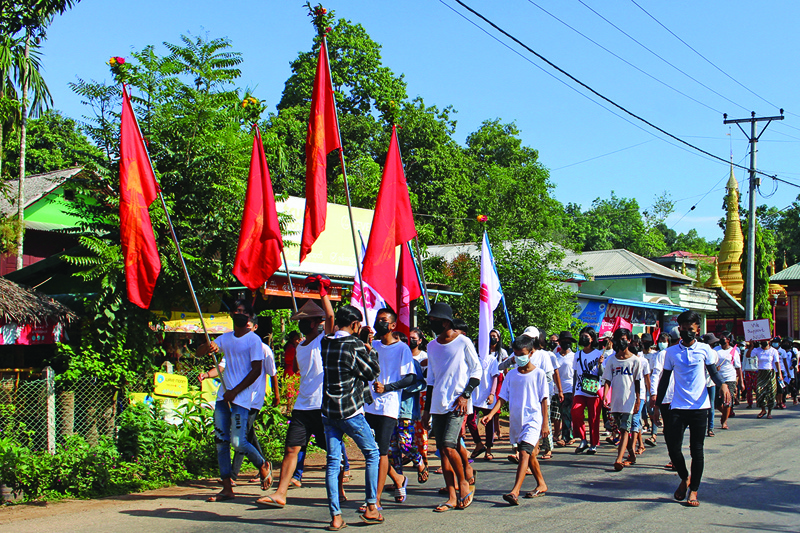 This handout photo taken and released by Dawei Watch yesterday shows protesters participating in a demonstration against the military coup in Dawei. - AFP
This handout photo taken and released by Dawei Watch yesterday shows protesters participating in a demonstration against the military coup in Dawei. - AFP
YANGON: One hundred days after the military seized power in Myanmar, the nun who pleaded for protesters on her knees in the street says the coup has cast a pall of fear and depression over the country. The image of Sister Ann Rose Nu Tawng kneeling in the dust, arms spread, begging police not to shoot "the children" went viral in March as an uprising swelled in Myanmar.
Today, the 45-year-old nun works in a clinic in Myanmar's northernmost Kachin state, tending to patients injured by security forces, sickened from stress, and even those who try to kill themselves. "With the consequences of the COVID-19 pandemic and brutal actions of the military, there are more people who feel depressed and want to commit suicide," she said.
"People are living in fear and they feel hopeless." Today, 100 days will have passed since the generals made their lightning power grab in the early morning of February 1, ousting and detaining civilian leader Aung San Suu Kyi. The period has seen Myanmar plunge into chaos as the army struggles to control widespread opposition to its rule.
Around 780 civilians have been killed, according to a local monitoring group, as security forces have sought to suppress near-daily protests with brutal crackdowns and live rounds. While praised for her bravery months ago, Sister Ann Rose Nu Tawng said she thinks instead of the youths who are still fighting.
"They are sacrificing their lives for their future." Night after night, soldiers and police raid homes to arrest suspected activists-both protesters and those taking part in the civil disobedience movement that has crippled the state's ability to function. Despite the dangers, the movement persists, fuelled by a young generation who came of age since democracy dawned and the country began opening up a decade ago. "We want to stand on the right side of history," said a protester in Myanmar's former capital Yangon.
'It's not going to quiet down'
The bloody intensity of the crackdowns has ebbed in recent weeks-partly as demonstrators have switched to flashmob tactics to avoid the risk of being shot. But if the violence in Myanmar's urban centers has slowed, clashes between the military and ethnic rebel armies in its border regions have intensified.
"It's not going to quiet down," said Yangon-based political analys Khin Zaw Win. "The regime thinks that everything will be okay by June, but it is a delusion." In eastern Karen state, the Karen National Union-who are sheltering dissidents fleeing to their territory-has captured military posts and been hit with multiple air strikes in return.
Clashes in northern Kachin state have also ticked up, and in a dramatic display of the rebel forces' capabilities, last week the Kachin Independence Army shot down a military helicopter. Several groups have come out in support of the anti-junta movement, even providing basic training to the young protesters. But so far, calls for the disparate rebel factions to unite into a "federal army" have not borne fruit.
Suu Kyi to appear in court
A judge yesterday ordered Myanmar's deposed leader Aung San Suu Kyi to appear in person in court for the first time on May 24, her lawyer said, after weeks of delays in her case. The Nobel laureate has not been publicly seen since she was detained in a February 1 coup, when the military ousted her from power and re-installed its rule. She was subsequently hit with a series of charges, and her legal team has faced an uphill battle to get a private audience with their client.
Multiple court hearings in the capital Naypyidaw have seen Suu Kyi-who attended via video conferencing from under house arrest-express frustration at the pace of the proceedings. During the latest hearing yesterday, a judge ordered for her cases to be heard with her present in a special courtroom near her residence. "She will appear in person in court on May 24," lawyer Khin Maung Zaw told AFP.
However, he cautioned that the outstanding issue of not being able to meet privately with her still remains. "The problem is not solved yet because the police did not answer on whether they can arrange our meeting," he said, adding that private counsel is "the right of the defendant".
The 75-year-old former leader has been charged six times since her arrest. The charges include flouting coronavirus restrictions during last year's election campaign and possessing unlicensed walkie-talkies. The most serious charge alleges that she violated the country's colonial-era Official Secrets Act-a case that is pending in a court in commercial hub Yangon. The junta has also accused her of corruption-though no charges have been filed-alleging that she received bribes of gold bars and cash. - AFP




